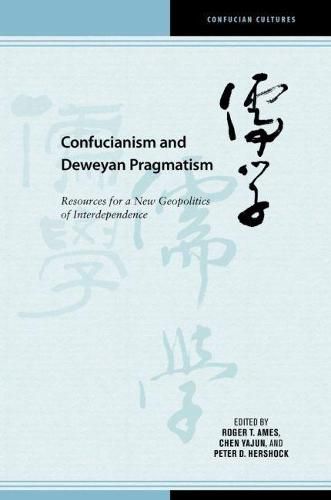Readings Newsletter
Become a Readings Member to make your shopping experience even easier.
Sign in or sign up for free!
You’re not far away from qualifying for FREE standard shipping within Australia
You’ve qualified for FREE standard shipping within Australia
The cart is loading…






Over the past generation, the rise of East Asia and especially China, has brought about a sea change in the economic and political world order. At the same time, global warming, environmental degradation, food and water shortages, population explosion, and income inequities have created a perfect storm that threatens the very survival of humanity. It is clear now that the Westphalian model of individual sovereign states seeking their own self-interest will not be able to respond effectively to this win-win or lose-lose crisis. In this volume, a cadre of distinguished scholars comes together to reflect on Confucianism and Deweyan pragmatism as possible resources for a new geopolitics that begins from an ontology of interdependence and recognizes the irreducibly ecological nature of the human experience at every level.
Both Confucian and Deweyan traditions emphasize the primacy of experience, the importance of vital relationality, and the moral roots of good governance. The potential benefits of conceptually blending the two are many. Indeed, the contemporary Chinese philosopher Tang Junyi provides us with a cosmological understanding of the idea of Confucianism that, in parallel to Dewey’s idea of democracy, can enable us to anticipate the core values, if not the specific contours, of a Confucian democracy. Just as Dewey’s idea of democracy is his vision of the flourishing communal life made possible by the contributions of the uniquely distinguished persons that constitute it, Tang Junyi’s Confucianism is a pragmatic naturalism directed at achieving the most highly integrated cultural, moral, and spiritual growth for the individual-in-community. In both, we find an affirmation of communal harmony as a process starting here and going there through which those involved learn together to do ordinary things in extraordinary ways. Just such a cosmological understanding of democracy is one way of describing what will be needed to address the many predicaments characterizing the environmental, cultural, socioeconomic, and political dynamics of the twenty-first century.
$9.00 standard shipping within Australia
FREE standard shipping within Australia for orders over $100.00
Express & International shipping calculated at checkout
Over the past generation, the rise of East Asia and especially China, has brought about a sea change in the economic and political world order. At the same time, global warming, environmental degradation, food and water shortages, population explosion, and income inequities have created a perfect storm that threatens the very survival of humanity. It is clear now that the Westphalian model of individual sovereign states seeking their own self-interest will not be able to respond effectively to this win-win or lose-lose crisis. In this volume, a cadre of distinguished scholars comes together to reflect on Confucianism and Deweyan pragmatism as possible resources for a new geopolitics that begins from an ontology of interdependence and recognizes the irreducibly ecological nature of the human experience at every level.
Both Confucian and Deweyan traditions emphasize the primacy of experience, the importance of vital relationality, and the moral roots of good governance. The potential benefits of conceptually blending the two are many. Indeed, the contemporary Chinese philosopher Tang Junyi provides us with a cosmological understanding of the idea of Confucianism that, in parallel to Dewey’s idea of democracy, can enable us to anticipate the core values, if not the specific contours, of a Confucian democracy. Just as Dewey’s idea of democracy is his vision of the flourishing communal life made possible by the contributions of the uniquely distinguished persons that constitute it, Tang Junyi’s Confucianism is a pragmatic naturalism directed at achieving the most highly integrated cultural, moral, and spiritual growth for the individual-in-community. In both, we find an affirmation of communal harmony as a process starting here and going there through which those involved learn together to do ordinary things in extraordinary ways. Just such a cosmological understanding of democracy is one way of describing what will be needed to address the many predicaments characterizing the environmental, cultural, socioeconomic, and political dynamics of the twenty-first century.